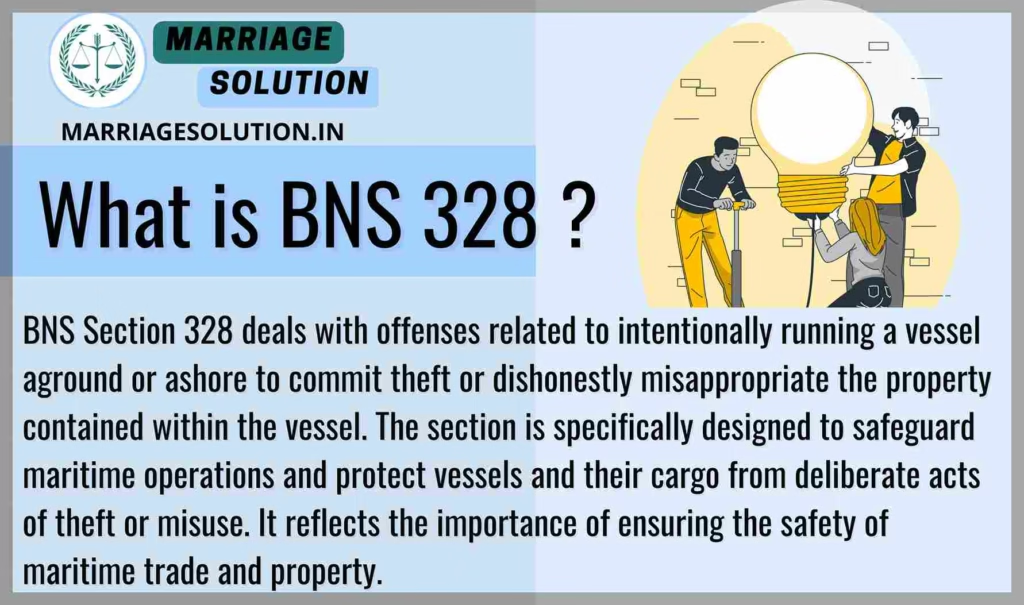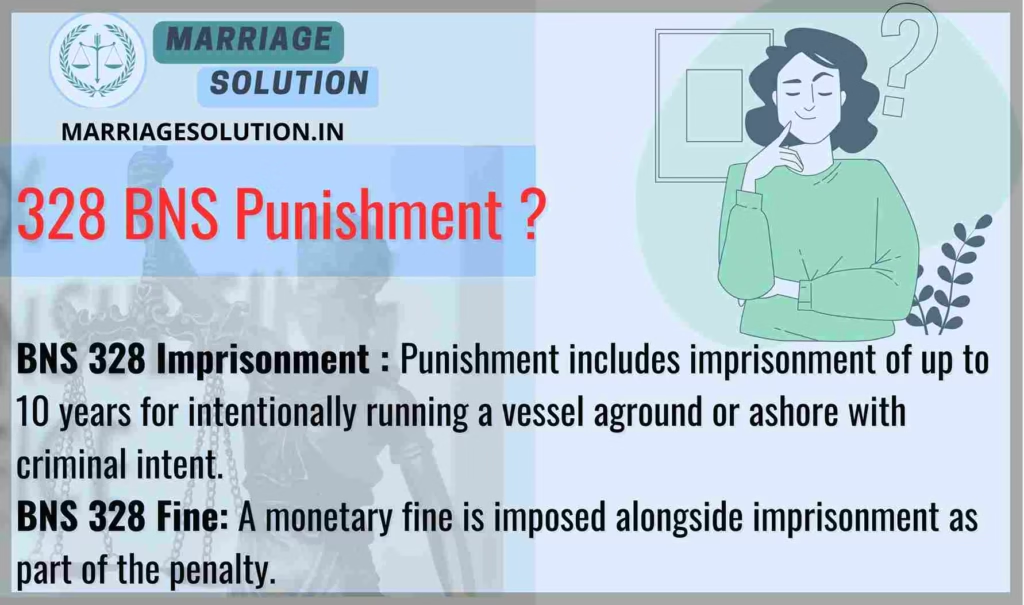Introduction of 328 BNS
BNS 328 deals with the intentional act of running a vessel aground or ashore to commit theft or dishonestly misappropriate property contained within it. By replacing IPC Section 439, this law ensures stricter protection of maritime trade, cargo, and shipping operations. The provision emphasizes that deliberate misuse of vessels for criminal purposes is a serious offense, carrying imprisonment of up to 10 years and a fine. It reflects India’s commitment to safeguarding maritime security, commerce, and property rights against fraudulent acts.
The Bharatiya Nyaya Sanhita (BNS) Section 328 replaces the old Indian Penal Code (IPC) Section 439.
What is BNS Section 328 ?
BNS Section 328 deals with offenses related to intentionally running a vessel aground or ashore to commit theft or dishonestly misappropriate the property contained within the vessel. The section is specifically designed to safeguard maritime operations and protect vessels and their cargo from deliberate acts of theft or misuse. It reflects the importance of ensuring the safety of maritime trade and property.

Under Section 328 of the bns act 2023
“Whoever intentionally runs any vessel aground or ashore with the intent to commit theft, or dishonestly misappropriate any property contained therein, shall be punished with imprisonment which may extend to ten years, and shall also be liable to fine.”
1. Meaning of the Offense
- This section applies when a person deliberately runs a vessel aground (on sand) or ashore (onto land).
- The act must be done with criminal intent → either to commit theft or to dishonestly misappropriate property inside the vessel.
- Accidental grounding of a vessel (for example, due to bad weather or navigation error) is not covered.
2. Who is Covered?
This law applies to:
- Crew members or outsiders → who intentionally ground the vessel for theft.
- Individuals colluding with workers → to steal cargo, machinery, or goods.
- Any person misusing maritime operations for dishonest personal gain.
3. Nature of the Offense
- Cognizable → Police can arrest without a warrant for swift action.
- Non-Bailable → Bail is not a matter of right, it is granted only by the court.
- Non-Compoundable → Cannot be privately settled; must go through court trial.
- Triable by Court of Session → Reflects the seriousness of maritime crimes.
4. Examples of BNS Section 328
- Cargo Theft: A crew member deliberately runs a cargo vessel ashore at night to steal electronics stored on board.
- Machinery Misappropriation: A shipyard worker colludes with others to ground a ship and secretly unload valuable construction machinery.
- Insurance Fraud: An owner deliberately runs his insured ship aground and misappropriates the goods to claim insurance money.
5. Punishment under BNS Section 328
- Imprisonment: Up to 10 years.
- Fine: In addition to imprisonment.
- Both: Court can impose both penalties in serious cases.
6. Importance of BNS Section 328
- Protects maritime trade and commerce from deliberate theft.
- Ensures safety of ships, crew, and cargo.
- Acts as a deterrent against organized maritime crimes.
- Strengthens India’s maritime law framework, replacing IPC 439.
Section 328 BNS Overview
BNS Section 328 states that any person who intentionally runs a vessel aground or ashore, with the intent to steal or dishonestly misappropriate property within it, or to facilitate such theft or misappropriation, shall be punished with imprisonment of up to 10 years and liable to a fine. This section ensures accountability for actions that threaten maritime property and safety.
BNS Section 328: Explanation in Key Points
1. Definition of the Offense
BNS Section 328 is focused on maritime crimes. The section states that if a person intentionally runs a vessel aground (stuck in shallow waters) or ashore (onto land) with the aim of committing theft or dishonestly using the goods, they are guilty of an offense.
- Ships and vessels carry valuable cargo like machinery, electronics, raw materials, or even fuel.
- Running the vessel ashore makes it easier for offenders to steal or misappropriate goods.
This section directly criminalizes such intentional acts.
2. Focus on Intent
One of the most important conditions under this section is intention.
- If the ship runs aground due to a storm, bad navigation, or engine failure, it is not a crime.
- But if the offender knowingly grounds the vessel to enable theft, fraud, or wrongful gain, it becomes punishable.
The court must prove that the act was deliberate and dishonest, not an accident.
3. Cognizable Offense
The offense is cognizable, which means:
- The police can register a case immediately.
- They do not need prior approval from a magistrate to arrest the accused.
This is important because ships and vessels may move quickly from one location to another, and immediate action is needed to protect cargo and property.
4. Non-Compoundable Nature
The law classifies this offense as non-compoundable, which means:
- It cannot be settled privately between the accused and the victim.
- The case must go through proper court procedures.
This prevents powerful offenders from “buying their way out” and ensures fair trial and punishment.
5. Punishment
The punishment is imprisonment up to 10 years plus a fine.
- 10 years of imprisonment shows how seriously the law treats crimes involving vessels and cargo.
- The fine adds a financial burden on the offender, ensuring that crime does not pay.
This severe penalty acts as a strong deterrent against maritime theft.
6. Trial by Court of Session
Cases under Section 328 are tried only in a Court of Session, not by lower magistrates.
- Maritime crimes often involve high-value cargo, multiple parties, and technical issues like ship movement and security.
- A Court of Session has the authority and resources to handle such serious and complex cases.
7. Non-Bailable Offense
The offense is non-bailable, which means:
- The accused cannot automatically get bail.
- They must convince the court why they should be granted bail.
This strict approach ensures that offenders do not easily escape punishment and prevents them from tampering with evidence or threatening witnesses.
8. Covers Theft and Misappropriation
This section is broad and covers not just direct theft but also dishonest misappropriation.
- Theft: Directly stealing goods like cargo, machinery, or ship supplies.
- Misappropriation: Wrongful use of ship property for personal gain (e.g., selling ship machinery, using cargo without permission).
Thus, even indirect wrongful acts fall under this law.
9. Maritime Security Protection
Maritime security is critical for India’s trade, as most imports and exports move through ships.
- This law ensures that cargo, crew, and vessels are safe from intentional harm.
- It discourages criminal groups from targeting ships for looting.
In effect, Section 328 protects India’s trade economy and national security.
10. Part of Wider Maritime Laws
This section works along with other provisions of the Bharatiya Nyaya Sanhita (BNS) and maritime laws like the Merchant Shipping Act.
- It builds a legal shield against crimes on the sea.
- It ensures that ships, ports, and trade routes are kept secure and reliable.
Examples of Section 328 in Action
- Example 1 – Cargo Theft
Ravi deliberately drives a cargo vessel ashore near a secluded port to steal cartons of electronics.
Guilty under Section 328 → up to 10 years imprisonment + fine. - Example 2 – Machinery Misappropriation
Ramesh, a shipyard worker, grounds a vessel intentionally to secretly unload and sell machinery from it.
Guilty under Section 328 → strict punishment including jail and fine.
328 BNS Punishment
BNS 328 Imprisonment
Punishment includes imprisonment of up to 10 years for intentionally running a vessel aground or ashore with criminal intent.
BNS 328 Fine
A monetary fine is imposed alongside imprisonment as part of the penalty.

328 BNS bailable or not ?
BNS Section 328 are classified as non-bailable. This means bail is not granted as a matter of right but is subject to judicial discretion, considering the seriousness of the offense and its implications for maritime security.
Bharatiya Nyaya Sanhita Section 328
| Section | Offense | Punishment | Bailable / Non-Bailable | Cognizable / Non-Cognizable | Trial By |
|---|---|---|---|---|---|
| BNS Section 328 | Intentionally running a vessel aground or ashore with the intent to commit theft or dishonestly misappropriate property contained in the vessel. | Imprisonment up to 10 years, and fine. | Non-Bailable | Cognizable | Court of Session |
| IPC Section 439 (Old) | Intentionally running a decked vessel or a vessel of twenty tons burden aground or ashore with intent to commit theft or misappropriation of property on board. | Imprisonment up to 10 years, and fine. | Non-Bailable | Cognizable | Court of Session |
BNS Section 328 FAQs
1. What does BNS Section 328 cover?
BNS Section 328 covers intentional acts of running vessels aground or ashore with the intent to steal or dishonestly misappropriate property on board.
2. What is the punishment under BNS Section 328?
The punishment includes imprisonment of up to 10 years and a fine. This reflects the gravity of maritime theft and property misappropriation crimes.
3. Are offenses under BNS Section 328 bailable?
No, offenses under BNS Section 328 are non-bailable, ensuring strict legal oversight before granting bail.
4. How are offenses under BNS Section 328 classified?
They are classified as cognizable and non-compoundable, allowing immediate police action and mandating court adjudication.
5. Who tries cases under BNS Section 328?
Cases are triable by the Court of Session, emphasizing the severity of such offenses.
6. How does BNS Section 328 protect maritime operations?
It acts as a deterrent against theft and misuse of maritime vessels, ensuring the protection of property and safe navigation for vessels involved in trade and commerce.
Conclusion
BNS Section 328 is an important legal safeguard for maritime operations and property security. By penalizing intentional acts of grounding vessels for theft or misappropriation, it ensures accountability and prevents abuse of shipping resources. With punishments extending up to 10 years imprisonment and fines, the law acts as a strong deterrent against crimes that threaten trade, navigation, and economic stability. This section not only strengthens India’s maritime security framework but also highlights the seriousness with which the legal system views offenses impacting global trade and public trust in shipping operations.
Need Legal Support?
If you are dealing with court cases, marriage problems, or any other legal issue, our team at Marriage Solution – Lawyer Help is here for you. Simply fill out our quick online enquiry form, and we’ll connect you with the right legal expert to support your needs.
Finished with BNS 328 ? Continue exploring the next provisions of the Bharatiya Nyaya Sanhita (BNS), 2023. Each section includes explanations, examples, and plain-language breakdowns for easy understanding.
- 329 BNS : Criminal trespass and house-trespass.
- https://marriagesolution.in/bns_section/329-bns/
- 330 BNS : House-trespass and house-breaking.
- https://marriagesolution.in/bns_section/330-bns/
- 331 BNS : Punishment for house-trespass or housebreaking .
- https://marriagesolution.in/bns_section/331-bns/
- 332 BNS : House-trespass in order to commit offence .
- https://marriagesolution.in/bns_section/332-bns/
- 333 BNS : House-trespass after preparation for hurt, assault or wrongful restraint.
- https://marriagesolution.in/bns_section/333-bns/
Full IPC Section List: https://marriagesolution.in/ipc-section-list
All Indian Law & Blogs: https://marriagesolution.in/indian-law/
Full BNSS Section List: https://marriagesolution.in/bnss_section-list
